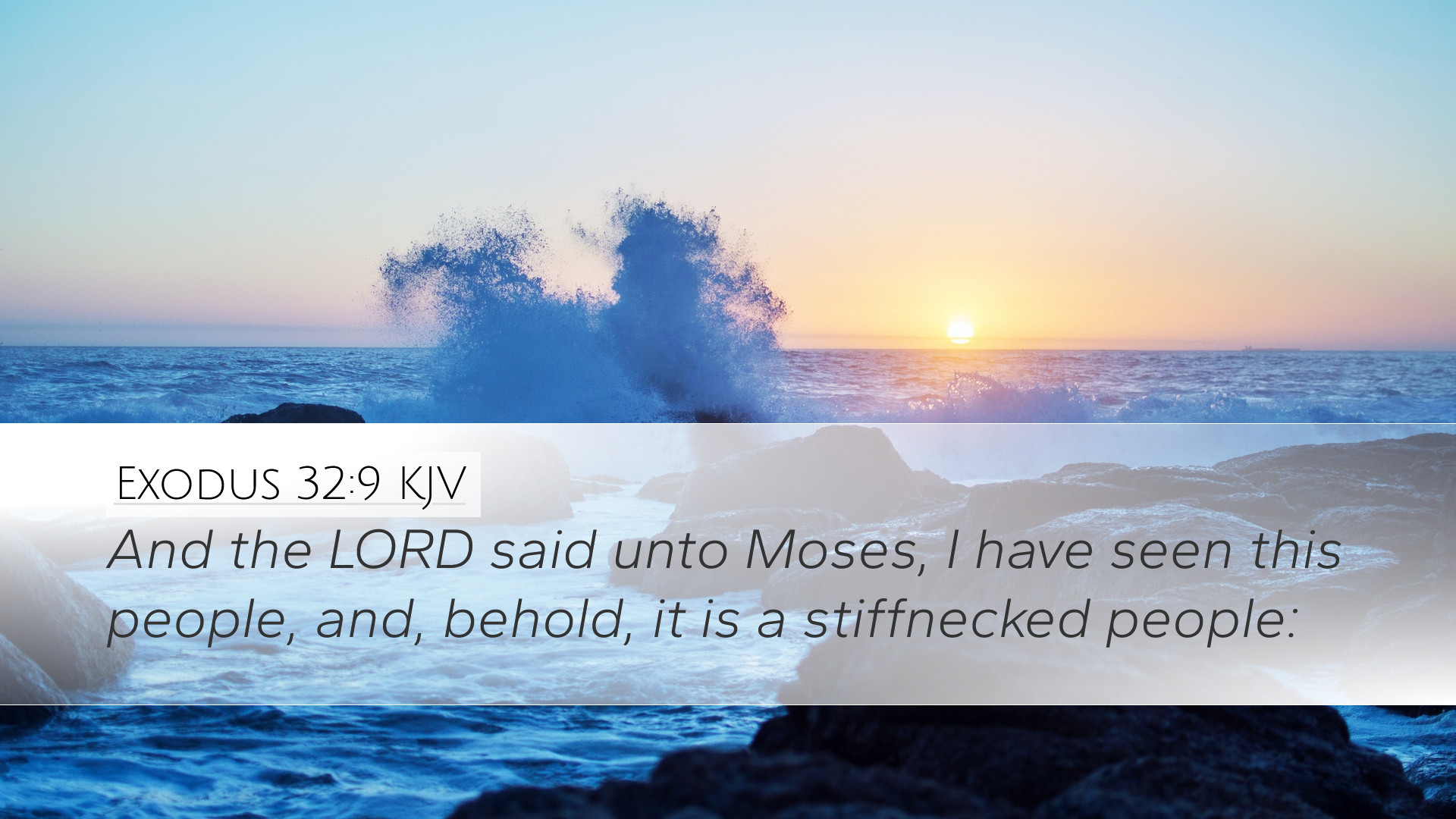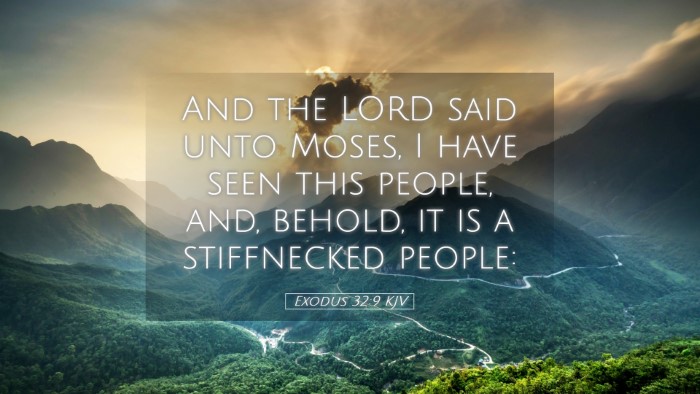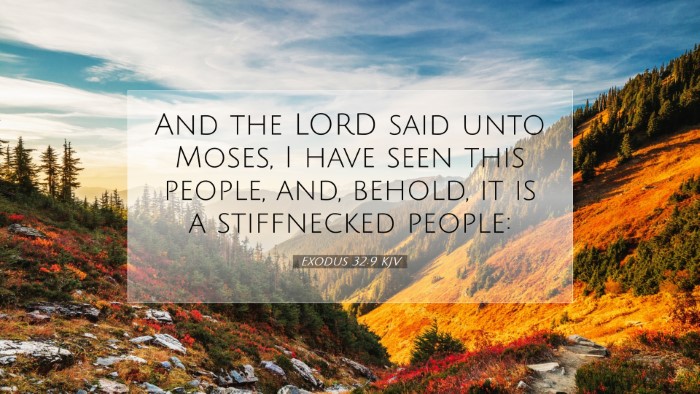Exodus 32:9 Commentary
Verse Context: In Exodus 32:9, we find a critical moment in Israel's history, where God confronts Moses regarding the idolatry of the people. This verse captures the gravity of Israel's sin and highlights God's response to their rebellion.
Insights from Public Domain Commentaries
1. Matthew Henry's Commentary
Matthew Henry comments on the starkness of God’s declaration to Moses. He notes that God sees the people as being “stiff-necked,” a term which signifies a stubbornness that resists correction. This characterization reveals the weight of their rebellion against God’s covenant. Henry emphasizes that God’s wrath is provoked not merely by this singular episode of idol worship, but by a pattern of disobedience that had marked Israel’s journey.
- Stubbornness in Rebellion: The term "stiff-necked" denotes a refusal to submit to divine authority.
- God's Awareness: The usage of "I have seen" suggests God’s omniscience and His continual engagement with His people.
- Implications of Idolatry: Henry underscores the severe implications of idolatry, which leads to a breakdown in the relationship between God and His covenant people.
2. Albert Barnes' Commentary
Barnes offers a detailed analysis of the term “stiff-necked,” explaining that it reflects a deeper cultural idiom referring to oxen that resist the yoke. This imagery serves to illustrate Israel’s refusal to follow God’s guidance. Barnes posits that this behavior stems from a lack of faith and reliance on God’s provision and instruction. The commentary stresses that such rebellion leads not only to divine displeasure but also to potential judgment.
- Idolatry as Rejection: Barnes points out that idol worship is ultimately a rejection of God’s character and revelation.
- God’s Patience: Despite their sin, God’s interaction with humanity showcases His patience and desire for repentance.
- Consequence of Stubborness: The consequences of being “stiff-necked” imply a departure from God’s protective care and guidance.
3. Adam Clarke's Commentary
Adam Clarke dives deep into the theological implications of this verse. He interprets “stiff-necked” as a metaphor rich in meaning, suggesting not only pride and insensitivity but also a blatant disregard for God’s will. Clarke emphasizes that the situation in Exodus 32 serves as a warning, highlighting the vulnerability of the people when they turn away from God’s instruction. His commentary encourages readers to reflect on the broader cultural implications of idolatry in modern society.
- Warning Against Idolatry: Clarke notes that the narrative serves as both a historical account and a timeless warning against falling into the trap of modern-day idols.
- The Nature of God’s Response: Clarke highlights that God’s anger is righteous and rooted in His holiness.
- Invitation to Repentance: Clarke points out how God's rebuke always carries with it an implicit invitation to return to Him.
Theological Themes
Central to Exodus 32:9 is the tension between divine judgment and mercy. The term “stiff-necked” encapsulates human disobedience, yet it also invites exploration into God’s character. Here are some pertinent theological themes that arise from this verse:
- Grace in Judgment: Even in His anger, God’s reactions are tempered with grace, as He offers an opportunity for repentance rather than outright destruction.
- The Nature of Idolatry: Idolatry remains a primary concern, not merely as a historical reality but as a contemporary challenge in various forms that modern believers face.
- Divine Relationship: The interaction between God and Moses illustrates the dynamic of intercessory prayer, showcasing how one can stand in the gap between divine wrath and human disobedience.
Application for Today
The lessons drawn from Exodus 32:9 are profound for today's church and believers:
- Self-Examination: Believers are called to regularly examine their lives for "stiff-necked" attitudes that resist God’s will.
- Intercessory Prayer: Just as Moses interceded for Israel, today's believers can advocate for their communities and nations, praying for forgiveness and guidance.
- Relevance of Idolatry: In an age of materialism and distraction, it is vital for Christians to identify and dismantle modern idols to remain faithful to God.
Conclusion
Exodus 32:9 challenges readers to confront the reality of spiritual stubbornness and the grave consequences of turning away from God. The combined insights of Matthew Henry, Albert Barnes, and Adam Clarke provide a rich tapestry of understanding this critical moment in Israel's history while also prompting contemporary reflection on our own relationship with God. In the face of rebellion, there remains an invitation to grace, repentance, and renewal. As pastors, students, theologians, and Bible scholars engage with this text, may they find renewed inspiration to pursue holiness and invoke intercessory prayer for the greater good of their communities.


